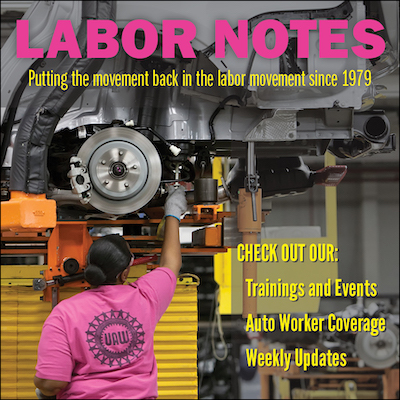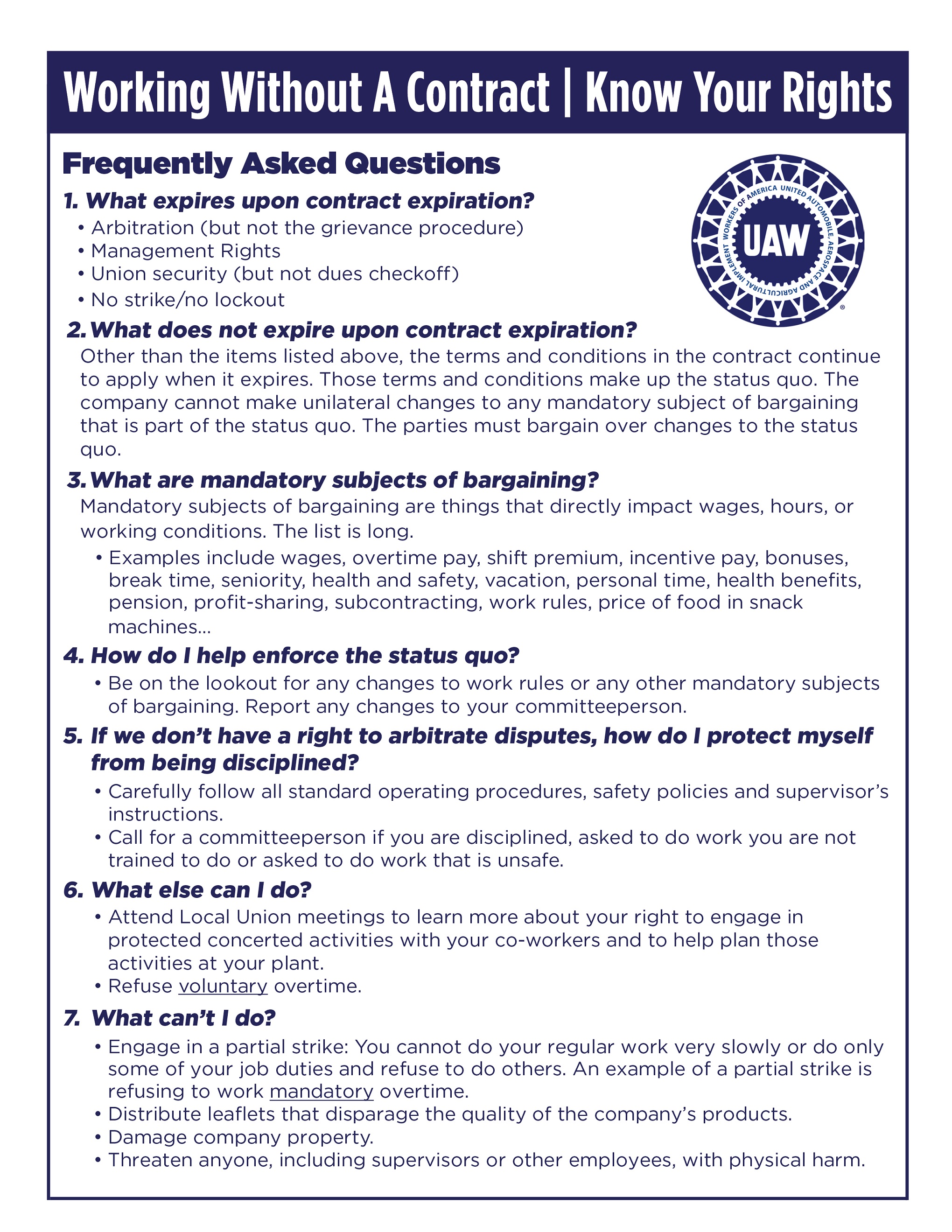Don’t Do the Boss Any Favors

Are you going the extra mile for the boss—skipping breaks, smoothing the work process? You don’t have to. Photo: Jim West, jimwestphoto.com.
Management everywhere relies on workers “going the extra mile.” We cut corners, we skip breaks, and we look the other way on common violations of the contract, work rules, or even safety.
But it’s also possible, when the time is right, to just stop doing the boss these favors. After all, how often does management do workers a favor?
As they build momentum for a possible strike, General Motors worker Nick Livick in Kansas City reports that his co-workers are refusing to help management as they normally would. Instead they are waiting for direct orders, and stopping the line when management starts it up early after a break.
DON’T WORK FOR FREE
In many workplaces, management relies on people working through their contractual breaks or lunches to get things done.
When management messed around with their breaks, a group of Florida letter carriers decided to take the break anyway. Management flipped out, but ended up relenting and giving them back their break.
PUT SAFETY FIRST
As much as bosses love to harp on the “safety first” motto, productivity and the bottom line usually trump safety. Most workplaces are rife with safety issues that workers accept as part of doing the job. What if you didn’t?
Letter carriers in Oregon got together to push back over safety when managers tried to get them to perform a heavier workload. All it took was filling out a safety concern form. One by one, people filed up to drop their forms on the manager’s desk. About half the carriers participated.
Within minutes the manager agreed to postpone the heaviest item till the next day. Relief—and power—zipped around the work floor.
FOLLOW THE RULES
Every workplace has rules on the books that aren’t followed in practice. Sometimes those rules aren’t followed because they were written by someone who’s never done the job. But sometimes they’re the right way to do something, but workers cut corners to get the work done faster.
Is management turning a blind eye to problems so that they can pass the issue on to the next group down the chain? Sending on a form with missing information, or continuing production in spite of a quality problem? Are you and your co-workers quickly signing off on things that shouldn't really be rubber-stamped? Like equipment inspections, logs? Are you skipping reading instructions thoroughly before you take on a task?
You don't have to.
Workers tend to have more legal protection for activities that are specifically covered in contracts and work rules. For example, your contract may say that everyone has the right to a certain number of breaks. Or work rules state that workers have a responsibility to notify their supervisor of quality issues.
Now-retired auto worker activist Gregg Shotwell wrote years ago about “Using Quality Language To Exert Shop Floor Power,” saying, “In the right hands rules can be powerful tools.”
IF YOU SAY SO…
Sometimes bosses need a taste of psychological warfare.
Teamsters at UPS in Boston pulled an easy stunt to back off an aggressive manager. The trick was that they all did it together. At the regular morning meeting, the steward gave the agreed-on signal and everyone turned their backs on Brian the Bully. They stayed that way for the remainder of the meeting.
“When everyone dispersed, the smiles on the drivers’ faces were priceless,” the steward said. And Brian was relieved of his morning-meeting duties, and suddenly discipline was cut way down.
More UPS Teamsters: In Columbus, Ohio, they went the “malicious compliance” route when supervisors were hounding drivers for extra overtime. Management was using escalating discipline to try to get enough drivers to show up for an extra shift, so members decided to all show up for the shift. Management was intimidated and everyone got an easier work day. With overtime.
The most important thing if you want to enforce the rules is to find something that people will do, and do together.
Power is in numbers. Better to pick something that you’re confident that more people will do than to start with the thing you think will have the most impact.
KNOW THE RISKS
But before you collectively decide “no more Mr. Nice Guy,” stop for a minute and think strategically about potential consequences.
For example, insubordination should be avoided where possible. If they give you a direct order, it’s safer to comply than to refuse.
Also, is what you’re considering explicitly forbidden in your union contract? Has your contract expired, and you’re working without one? These things matter in terms of how much protection you have.
For example: many contracts include rights for individual workers to call out sick, but a sick-out (when a group of workers call in sick as part of a job action) is often explicitly listed as a work stoppage.
If you’re working without a contract, though, there’s no no-strike clause. Labor law allows all workers, union and non-union, to take collective action for their mutual benefit—and a work stoppage is one of those collective actions.
Just because something is legal doesn’t mean you won’t get fired for it, of course, by a hot-headed manager. Weigh the risks carefully; the greatest safety is in your numbers.








